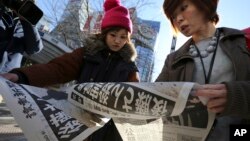Japan’s role on the world stage has been brought into sharp focus by the executions of two Japanese nationals by the Islamic State terror group in Syria. Prime Minister Shinzo Abe wants to change the country’s pacifist stance and take a more proactive role in global security. But many Japanese disagree.
On the streets of Tokyo, there is much uncertainty about how their country should react to the murders of Kenji Goto and Haruna Yukawa by the terror group Islamic State.
Student Ryo Murata says that it happened in a place far away from Japan, but the victims are Japanese. It’s terrible that they were killed in such a place, she says.
Fellow student Kyousuke Kamogawa says he is scared. “The militants were saying they will start to target Japanese citizens from now on. That sends chills down my spine,” he adds.
Japan’s first challenge is facing the terror threat posed by the Islamic State, says John Swenson-Wright, head of the Asia Program at policy group Chatham House.
“Are they going to retreat into position of relative isolation in the face of the shock that this execution represents? Or are they going to accept the logic that Japan is inevitably embroiled in international affairs in a way that doesn’t allow it to take that low profile position?” asks Swenson-Wright.
A forthright response
Islamic State says it targeted the Japanese hostages because Tokyo offered $200 million in non-military aid to countries fighting the terror group. Prime Minister Shinzo Abe was forthright in his response to the executions.
Abe said that Japan will cooperate with the international community to make Islamic State atone for their crimes. Japan will never yield to terrorism.
His determination to engage in the fight could be costly, says Professor Koichi Nakano of Sophia University in Tokyo.
“There are people who blame Abe for having brought the crisis in the first place, while there are others who agree with Abe and argue that this is why Japan should do more in the fight against terrorism,” said Nakano.
Postwar constitution
Currently Japan’s postwar constitution bars its armed forces from participating in conflicts overseas. In the wake of the beheadings, Prime Minister Abe is seeking changes to allow self-defense forces to rescue Japanese citizens abroad.
From his first days in office, Prime Minister Abe has pushed for Japan to play a bigger role in global security, says Alessio Patalano of King’s College London.
“He wanted to slowly engage with the question, ‘as a military actor, what kind of actor do you want to be? That was one of the questions he wanted to engage with with the Japanese public, and also with the United States,” said Patalano.
Its allies want Japan to strengthen its global capabilities, says John Swenson-Wright of Chatham House.
“The international community expects Japan to demonstrate that on political and strategic issues, it’s willing to get engaged. And Mr. Abe of course I think is, in terms of his personality, is eager to seize that opportunity,” he said.
Analysts say many Japanese do not share that eagerness.




